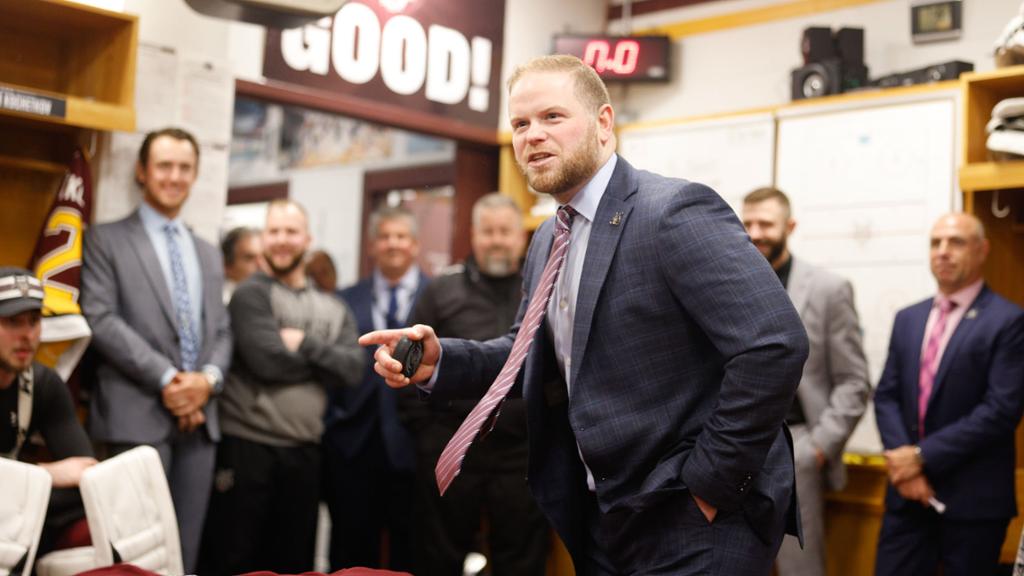Ryan Warsofsky is aware of the chuckles from his players.
The 34-year-old has emerged as one of the brightest coaching prospects in the American Hockey League by guiding Chicago (Carolina Hurricanes) to the best record during the regular season and into the Calder Cup Final against Springfield (St. Louis Blues). Game 3 is Wednesday in Springfield with the best-of-7 series tied after Chicago’s 6-2 victory in Game 2 on Sunday.
Though the success has Warsofsky in position to where he could soon start getting interest from NHL teams, he’s stayed true to his core belief of remaining in the present moment. Whether at training camp, during a morning practice on the road in November, or under the bright lights of the Calder Cup Final, the native of North Marshfield, Massachusetts rarely wavers from the mantra.
“I think the guys will probably mimic me at times, because I’m just all about just staying the course and staying on [track],” Warsofsky said. “I think as a coach, you need to continue to preach what your message is. I just think I keep harping on it and understand that you can only focus on so much. You can only worry about so much.”
Until the Columbus Blue Jackets hired Trent Vogelhuber, 33, as coach of their Cleveland affiliate June 8, Warsofsky had been the youngest coach in the AHL. He was 31 when the Hurricanes promoted him July 10, 2019 from an AHL assistant to coach Charlotte, their affiliate at the time. His hiring came one month after Charlotte won the 2019 Calder Cup while apprenticing for coach Mike Vellucci, now an assistant for the Pittsburgh Penguins. Warsofsky handled what was the top penalty kill in the league (86.6 percent) that season.
Like many coaches, Warsofsky has encountered considerable turbulence because of the COVID-19 pandemic. After Charlotte went 34-22-5-0 in the abbreviated 2019-20 season, the Hurricanes shifted their AHL affiliation to Chicago. In 2020-21, the Nashville Predators joined to form a dual affiliation with Chicago for one season. The Wolves were 21-9-1-2 under Warsofsky and Milwaukee coach Karl Taylor, third-best in the AHL.
This season, the Predators returned to their long-running affiliation with Milwaukee. Chicago finished 50-16-5-5 before sweeping Rockford (Chicago Blackhawks), eliminating Milwaukee and defeating Stockton (Calgary Flames) in the Western Conference Final. Stockton had finished second overall in the AHL.
Warsofsky is 105-47-11-7 (.671) in three seasons. He’s part of a highly productive coaching tree from South Carolina in the ECHL, an affiliate of the Washington Capitals: Colorado Avalanche coach Jared Bednar, Calgary assistant Cail MacLean and Toronto Maple Leafs assistant Spencer Carbery.
A college player at Sacred Heart and Curry College, Warsofsky earned his first pro job in 2013 at age 25 as an assistant for South Carolina. He was named coach after three seasons, took the Stingrays to the 2017 Kelly Cup Final (they were swept by Colorado) and was 88-44-10-2 in two seasons before becoming an assistant for Charlotte in 2018.
In a league where the objective is to advance to the NHL, a perennial challenge for AHL coaches is marrying team goals of development and winning with a player’s desire to succeed as an individual. Considerable roster turnover further complicates that mission.
Warsofsky has been willing to confront that issue with his players and acknowledge their individual goals, which may include a full-time NHL role, a new AHL contract or positioning oneself for opportunities elsewhere.
“You’re going to need your teammates and you’re going to need your team to help you get to those goals,” Warsofsky said. “I really believe if you have team success, individual success comes with that. And on top of that come new contracts where you’re getting a pay raise or a one-way [NHL contract], whatever that might be.
“That’s something that we talked about really early in the season and into the second half. You know that there are a lot of individual goals that guys have, and that’s good. We want that.”
As a competitor with his own personal career targets, Warsofsky understands that mentality from his players at this level.
“I think we’re honest as a staff, and I’m extremely honest to the player, whether that’s his individual goals or his play,” Warsofsky said. “Let’s just get right to the point. This is what I’m seeing. This is what you’re seeing. OK, how can we fix it? And how can we move forward together?
“It’s not me versus the player. We’re all in this together. I’m trying to get better. They’re trying to get better, and I think if you have an open type of dialogue like that, you can really move forward and improve on both ends.”
Photo credit: Ross Dettman/Chicago Wolves
